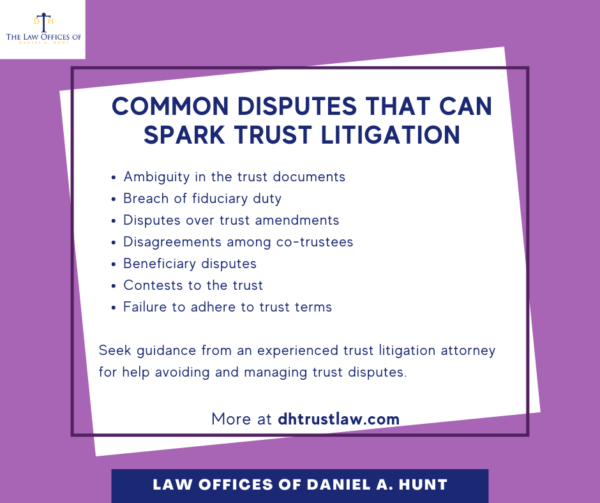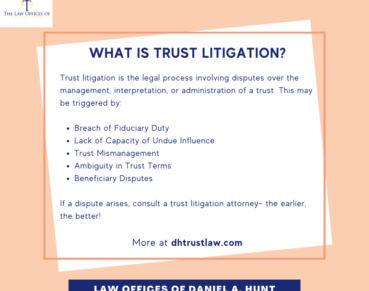Common Disputes That Can Spark Trust Litigation

Trusts are powerful tools for estate planning, offering numerous benefits. But trusts can sometimes become a source of contention among family members and other interested parties. When disputes arise, they can lead to trust litigation, a process that can be both emotionally and financially draining. Understanding the common disputes that spark trust litigation can help trustees and beneficiaries navigate these conflicts more effectively.
Ambiguity in Trust Documents
One of the most common triggers for trust litigation is ambiguity in the trust documents. When the language used in a trust is unclear or open to multiple interpretations, it can lead to disagreements among beneficiaries and trustees. For example, vague terms regarding the distribution of assets or the responsibilities of the trustee can result in conflicting expectations.
To avoid such disputes, find an experienced estate planning attorney to draft or update trust documents. They will know how to implement precise and unambiguous language that reflects the settlor’s current wishes and circumstances.
Breach of Fiduciary Duty
Trustees have a fiduciary duty to act in the best interests of the beneficiaries and to manage the trust assets responsibly. Allegations of a breach of this duty can lead to litigation. Common examples of fiduciary breaches include mismanagement of trust assets, self-dealing, failure to provide a timely and accurate accounting, and lack of impartiality among beneficiaries.
Beneficiaries who suspect a trustee of breaching their fiduciary duty can seek legal action to remove the trustee and recover any losses incurred due to the breach.
Disputes Over Trust Amendments
Over time, the settlor of a trust may amend their documents to reflect changes in their wishes or personal circumstances. However, disputes can arise when beneficiaries believe that a trust amendment is invalid. Challenges to trust amendments often involve allegations of undue influence, lack of mental capacity, or fraud.
For instance, let’s say a settlor amends their trust shortly before their death and disinherits one or more beneficiaries. The disinherited parties could claim that another beneficiary unduly influenced the settlor or that the settlor did not have the mental capacity to make such decisions.
Disagreement Among Co-Trustees
When a trust appoints multiple co-trustees, conflicts can occur if they disagree on how to manage the trust or distribute the assets. Co-trustees are expected to work together harmoniously, but differing opinions and personal conflicts can lead to a breakdown in communication and cooperation. These disagreements can delay trust administration and cause frustration among beneficiaries, potentially leading to litigation to resolve the impasse.
Sometimes it is better to appoint a professional fiduciary to act as trustee instead of co-trustees who will likely struggle to get along.
Beneficiary Disputes
Beneficiaries may also have conflicts with one another that lead to trust litigation. Common disputes include disagreements over the distribution of assets, claims of favoritism, or disputes regarding the interpretation of the trust terms.
For example, if the settlor’s intent is unclear, beneficiaries may disagree on how to divide certain assets, leading to prolonged legal battles. Open communication and mediation can sometimes resolve these issues without resorting to litigation.
Contested Trusts
Trust contests occur when an interested party challenges the validity of the entire trust. These challenges are often based on claims that the trustor lacked the mental capacity to create the trust or that the trust was created or amended under duress, undue influence, or fraud. Contested trusts can lead to lengthy and costly litigation, as the court must evaluate evidence and testimony to determine the validity of the trust.
Failure to Adhere to Trust Terms
Trustees are obligated to follow the specific terms set forth in the trust document. If a trustee fails to adhere to these terms, beneficiaries may seek legal recourse. For example, if a trust specifies that a certain asset must be distributed to a particular beneficiary by a specific date and the trustee fails to comply, the affected beneficiary can file a lawsuit to enforce the trust terms.
Seek Legal Counsel
When conflicts arise, seek professional guidance from an experienced trust litigation attorney who can help you find peace of mind. With an effective legal strategy, you may be able to resolve issues before they escalate into full-blown litigation. If litigation becomes necessary, your attorney can protect your interests and guide you through the complex landscape of trust litigation.
If you have any questions about common disputes that can spark trust litigation, feel free to contact our law firm.
Law Offices of Daniel A. Hunt
The Law Offices of Daniel A. Hunt is a California law firm specializing in Estate Planning; Trust Administration & Litigation; Probate; and Conservatorships. We've helped over 10,000 clients find peace of mind. We serve clients throughout the greater Sacramento region and the state of California.




